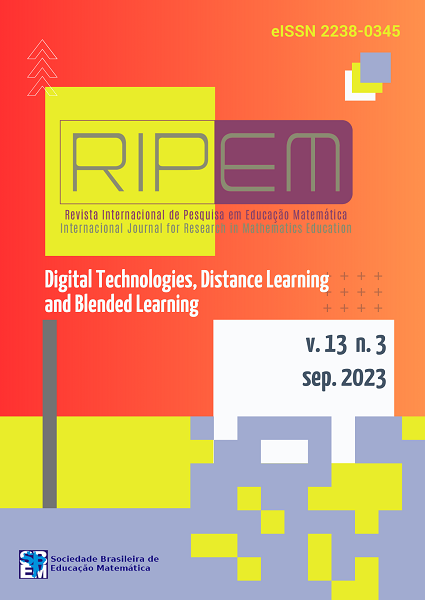Mathematical modelling when the problem is proposed with digital video: multi-voicedness, multimodality, domestication
DOI:
https://doi.org/10.37001/ripem.v13i3.3575Palavras-chave:
Humans-With-Media, Activity Theory, Social SemioticsResumo
This article describes research that explored the possibilities of digital video in mathematical modelling practices. It was developed in an online course aimed at in-service teacher education. Its scenario was a modelling practice in which a problem is proposed through a digital video (modelling videoproblem) and the participants are challenged to produce a video as an answer (modelling videoresponse). This is qualitative research based on the theoretical perspectives of the humans-with-media construct, Activity Theory, and Social Semiotics. The results point out that the way of combining semiotic resources in the videoproblem scenes influences the production of meanings and the modelling, and that the underutilization of resources of this media can limit educational possibilities. Furthermore, from the combination of different theoretical approaches, new theorizations emerge to be explored in future investigations.
Downloads
Referências
Alfke, D. S. (2017). Mathematical modelling with increasing learning aids: a video study. In: G. Stillman, W. Blum & G. Kaiser. (Org.). Mathematical Modelling and Applications. International Perspectives on the Teaching and Learning of Mathematical Modelling. (pp. 25-35). Springer, Cham.
Araújo, J. L. (2010). Brazilian research on modelling in mathematics education. ZDM Mathematics Education, 42, 337-348.
Bezemer, J. & Jewitt, C. (2010). Multimodal analysis: key issues. In: L. Litosseliti. (Org.) Research methods in linguistics. (pp. 180-197). London: Continuum International Publishing Group.
Bogdan, R. & Biklen, S. (1994). Investigação qualitativa em educação. Portugal: Porto Editora.
Borba, M. C. & Canedo Junior, N. R. (2020). Modelagem matemática com produção de vÃdeos digitais: reflexões a partir de um estudo exploratório. Com a Palavra, o Professor, 5(11), 176-189.
Borba, M. C. & Villarreal, M. E. (2005). Humans-with-media and the reorganization of mathematical thinking: information and communication technologies, modeling, experimentation and visualization. New York: Springer.
Borba, M. C. (2009). Potential scenarios for Internet use in the mathematics classroom. ZDM Mathematics Education, 41(4), 453-465.
Borba, M. C. (2021). The future of mathematics education since COVID-19: humans-with-media or humans-with-non-living-things. Educ Stud Math, 108, 385-400.
Borba, M. C. & Penteado, M. G. (2001). Informática e Educação Matemática. Belo Horizonte, MG: Autêntica.
Borba, M. C.; Canedo Junior. N. R. & Carvalho, G. S. (2022). O estar no mundo com as tecnologias: seres-humanos-com-mÃdias: etnomatemática, Geni, Zepellin e o inédito viável. In: J. C. Valle (Org.). Paulo Freire e educação matemática: há uma forma matemática de estar no mundo. (pp. 39-63). São Paulo, SP: Livraria da FÃsica.
Borba, M. C.; Scucuglia, R. S. & Gadanidis, G. (2014). Fases das tecnologias digitais em educação matemática: sala de aula e internet em movimento. Belo Horizonte, MG: Autêntica Editora.
Borba, M. C.; Souto. D. L. P. & Canedo Junior, N. R. (2022). VÃdeos na educação matemática: Paulo Freire e a quinta fase das tecnologias digitais. Belo Horizonte, MG: Autêntica.
Canedo Junior, N. R. (2021). A participação do vÃdeo digital nas práticas de modelagem quando o problema é proposto com essa mÃdia. 194 f. 2021. Tese (Doutorado em Educação Matemática). Universidade Estadual Paulista. Rio Claro, SP.
Domingues, N. S. & Borba, M. C. (2017). VÃdeos digitais nos trabalhos de modelagem matemática. Educação Matemática em Revista, 22, 38-50.
Engeström, Y & Sannino, A. (2010). Studies of expansive learning: foundations, findings and future challenges. Educational Research Review, 5(1), 1-24
Engeström, Y. (2001). Expansive learning at work: toward an activity theoretical reconceptualization. Journal of Education and Work, 14(1), 133-156.
Freire, P. (1987). Pedagogia do oprimido (17. ed). Rio de Janeiro, RJ: Paz e Terra.
Jewitt, C. & Kress, G. (2010). Multimodality, literacy and school English. In: D. Wyse; R. Andrews & J. Hoffma (Org.). The routledge international handbook of English, language and literacy teaching. (pp. 342-356). London: Taylor & Francis e-Library.
Jewitt, C. (2005). Classrooms and the design of pedagogic discourse: a multimodal approach. Culture & Psychology, 11(3), 309-320.
Kress, G. (2009). Multimodality: a social semiotic approach to communication. London: Routledge Falmer.
Lévy, P. (1993). As tecnologias da inteligência: o futuro do pensamento na era da informática. São Paulo, SP: Editora 34.
Orey, D.C. & Rosa, M. (2018). Developing a mathematical modelling course in a virtual learning environment. ZDM Mathematics Education, 50, 173-185.
Paraizo, R. F. (2018). Aprendizagem pela modelagem matemática associada a questões ambientais num contexto de produção de vÃdeos no ensino médio. 2018. 344f. Tese (Doutorado em Educação para a Ciência). Universidade Estadual Paulista. Bauru, SP.
Souto, D. L. P. & Borba, M. C. (2018). Humans-with-internet or internet-with-humans: a role reversal? Revista Internacional de Pesquisa em Educação Matemática, 8(3), 2-23.
Souto, D. L. P. (2013). Transformações expansivas em um curso de educação matemática a distância online. 2013. 281f. Tese (Doutorado em Educação Matemática). Universidade Estadual Paulista. Rio Claro, SP.
Tikhomirov, O. K. (1981). The psychological consequences of computerization. In: J. V. Wertsch (Org.). The concept of activity in soviet psychology. (pp. 256-278). New York: M. E. Sharpe.
Villarreal, M. & Borba, M. C. (2010). Collectives of humans-with-media in mathematics education: notebooks, blackboards, calculators, computers and notebooks throughout 100 years of ICMI. ZDM Mathematics Education, 42, 49-62.
Publicado
Como Citar
Edição
Seção

Este trabalho está licensiado sob uma licença Creative Commons Attribution-NonCommercial-ShareAlike 4.0 International License.








